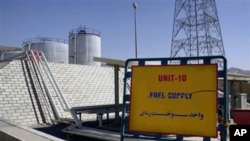Major Western powers have refused to attend a guided tour Saturday by Iran of several of its nuclear facilities. The U.S. and the European Union insist that only experts from the International Atomic Energy Agency should be responsible for nuclear inspections.
Iranian officials are describing the tour Saturday of an unfinished nuclear reactor as a goodwill gesture which proves the peaceful intent of its nuclear program. Diplomats from at least five countries, Algeria, Cuba, Egypt, Syria and Venezuela, visited the Arak heavy water reactor in Central Iran and met Iranian scientists.
Iran did not invite the U.S. to participate and the European Union refused to send anyone, insisting that only inspectors from the International Atomic Energy Agency are competent to judge if Iran’s nuclear program is peaceful.
Iran’s Ambassador to the IAEA, Ali Asghar Soltanieh, claimed that Tehran was behaving in good faith by conducting Saturday’s tour, but that major powers who did not attend, were not. "The tour is a clear signal of transparency and confidence building and this positive initiative has been welcomed by almost all member states of the IAEA except a few," he said.
Iran’s new acting foreign minister, Ali Akbar Salehi, told a press conference that Tehran has invented new treatments in nuclear medicine, arguing that the developments proved the peaceful intent of its nuclear program. Tehran, he insisted, has no reason to seek nuclear weapons:
He says that (Western powers) have nuclear weapons themselves, and seek even more such weapons, and still they point the finger at us. But, he insists, Iran doesn’t need nuclear weapons, because its doctrine is against them and because Iran has Islam, which is stronger than nuclear weapons, in addition to the human capital of its own people.
Iran’s top leaders regularly insist that Tehran is not pursuing nuclear weapons. Most Western nations, however, suspect that it is using its civilian program as a cover for a clandestine military effort to build nuclear weapons.
Alex Vatanka, an Iranian-born scholar at the Middle East Institute in Washington, stresses that Ali Akbar Salehi appears to be presenting a catalogue of Iran’s usual positions, without anything specific or new.
"It sounds like he's delivering a consensus line that's been produced in Tehran, which doesn't really refer to anything specific in terms of what the world wants to hear, and that is bad news. You can only be pessimistic. It's like saying that Venezuela and Syria are going to declare the Iranian nuclear program is healthy and there is nothing to be looked at here. If it were down to Syria and Venezuela that would have been said eight years ago, when Natanz was discovered," he said.
Emanuele Ottolenghi, a senior fellow at the Foundation for the Defense of Democries, calls Saturday’s tour of Iran’s nuclear facilities a "propaganda stunt" and insists that Tehran is circumventing, once again, the core issue of allowing IAEA inspectors to visit its nuclear facilities.
"The role of inspections is to be played by the International Atomic Energy Agency, by their inspectors, who are experts, and nobody else can fulfill that role. Iran, according to IAEA reports has been trying systematically to prevent inspectors with years of expertise in the Iranian program from getting access. It is trying to veto the appointment or the confirmation of such inspectors and it has been slowly, but systematically reducing access by the IAEA to the sites that the IAEA used to be able to inspect," he said.
Iran’s nuclear tour Saturday comes just five days before talks in Istanbul, Turkey between Iran, and major world powers. Iranian President Mahmoud Ahmadinejad has insisted repeatedly that Tehran has "no intention to discuss its nuclear program," at those talks.
Major Powers Decline Iran's Invitation to View Nuclear Sites




